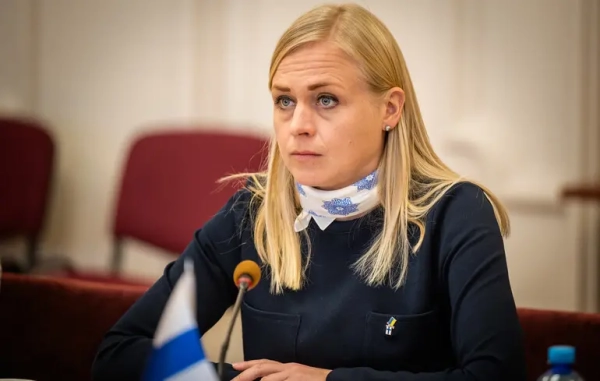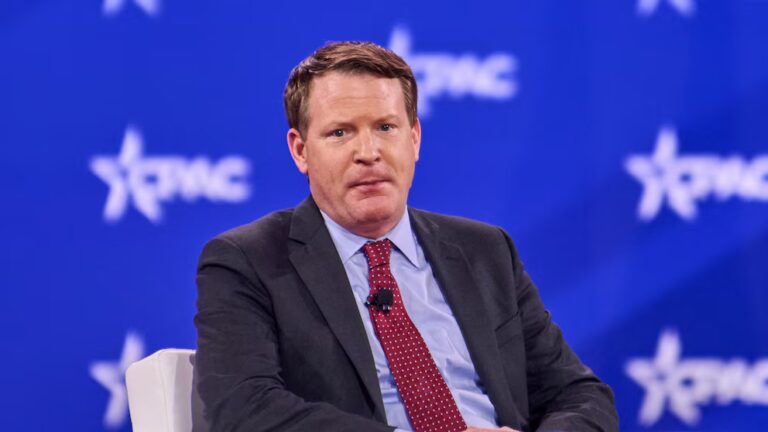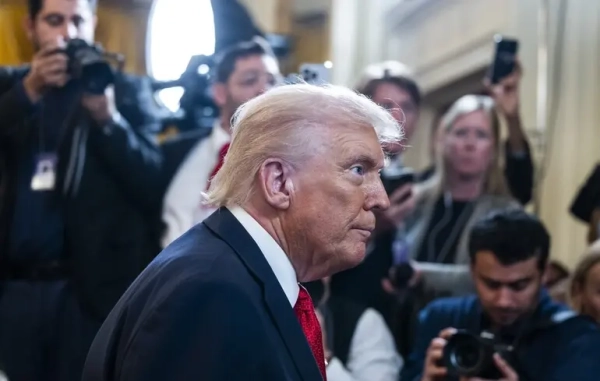The Kennedy family members have long been standard-bearers in the Democratic Party — a fact Robert F. Kennedy Jr. has sought to capitalize on in his bid to defeat President Joe Biden in the contest for the 2024 Democratic presidential nomination.
But Kennedy — the nephew and son of party stalwarts President John F. Kennedy and Attorney General Robert F. Kennedy, respectively — refused to close the door last week on leaving his party's primary amid a bitter fight with the Democratic National Committee over its rules governing the nomination process, even after saying he would only run as a Democrat.
Speaking during a town hall in North Charleston, South Carolina, last week, Kennedy said he was keeping all options open when asked by an attendee if he was prepared to run an independent campaign amid perceived hurdles erected by the DNC, which the campaign claims were built to foil his candidacy.
MORE: If RFK Jr. Wants To Be President, He’s Running In The Wrong Primary
"They're trying to make sure that I can't participate at all in the political process, and so I'm going to keep all my options open," Kennedy said of the DNC. A day later, he told another crowd in New Hampshire that he "would have to make a call before Oct. 15" if he were to decide to run independently.
While Kennedy has long assumed the role of an outsider Democratic candidate up against Biden's better-established and better-funded incumbency, he has frequently brushed aside questions about any potential third-party bids.
During a NewsNation town hall in June, Kennedy called being a Democrat part of his identity.
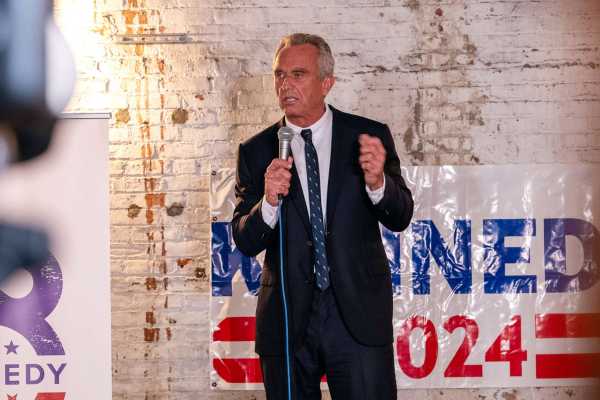
Democratic presidential candidate Robert F. Kennedy, Jr. holds a campaign event on August 30, 2023 in Brooklyn, New York.Spencer Platt/Getty Images
"You know, people have said to me, 'why don't you run it as an independent' … and I say 'because I'm a Democrat,'" Kennedy said.
"This is who I am. This is my identity. But I want my party back. I want my party to be … the party that I grew up in. The party of John Kennedy, the party of Robert Kennedy, the party of FDR and Harry Truman," he said.
And again, when asked during a late-August Fox News interview if he would consider a third-party bid in the 2024 election, Kennedy explicitly said he would not.
MORE: Robert Kennedy Jr.'s presidential campaign attracts GOP-friendly donors, few celebs
"No, I'm a Democrat. You know, I'm a traditional Democrat, and … part of my mission here is to summon the Democratic Party back to its traditional ideals," Kennedy said. "I'm not surprised that the people who are aligned with the DNC, people who are closely aligned with the White House, are troubled by my candidacy."
When asked by ABC News a day after his North Charleston town hall if he were willing to make a third-party run, Kennedy said that he was going to "wait and see."
"I'm hoping to run in the Democratic Party. If it's possible to have a fair election in the Democratic Party, I will run in the Democratic Party, and I haven't made any kind of plans other than that," he said.
Reached by ABC News, campaign manager and former congressman Dennis Kucinich dismissed that there was any shift in messaging around a potential third-party bid.
"Well, first of all, I'm not ready to acknowledge that there's any shift," he said. "We're trying to stop the Democratic Party from making a mistake. We're trying to help the Democratic Party come to reconcile with its own voting base."
Kucinich added, "regardless of what's been said, even by the candidate himself, we have not abandoned hope for the Democratic Party."
MORE: What RFK Jr., now a presidential candidate, has said about Ukraine, vaccines, more
Though a frequent critic of the DNC on the campaign trail, Kennedy's attacks have reached a fever pitch over the past few weeks, with Kennedy and his campaign publicly and privately blasting the DNC's recent primary calendar shakeups and making other allegations of proposed rule changes and vote-rigging.
In early September, the Kennedy campaign said they'd emailed DNC Chair Jamie Harrison requesting a meeting between party leadership and the candidate to discuss "voter rights and protection of the people's voice" while requesting "full transparency" related to nomination process matters.
Harrison replied to Kennedy's campaign Tuesday with an offer to meet. Kennedy responded with a separate, open letter on Wednesday night, still accusing the party of engaging in "repeated interference in the primary elections" and imploring it to hold "the most transparent, equal, accessible, and accountable election that has ever been seen in this country."
Among Kennedy's top complaints with the party's nomination process are changes to the primary calendar, which could see classic early-voting states such as Iowa and New Hampshire striped of their convention delegates if they are out of compliance with the national party's election calendar, which is slated to have South Carolina vote first. Kennedy's campaign is still hitting Iowa and New Hampshire nonetheless.
When asked why, if the Kennedy campaign is committed to winning a Democratic primary, it was expending resources on states that appear poised to lose their delegates, Kucinich said that the DNC was playing a dangerous game by neglecting the two states, which place significant value on retail politics and pride in their respective "first in the nation" statuses.
"One of the major failures in the foresight of the leadership … of the Democratic Party, is that they appear to be writing off New Hampshire's four electoral votes, Iowa's six electoral votes, and I have yet to see a presidential race where any party would want to spot the other 10 electoral votes," Kucinich said. "Mr. Kennedy is reaching out to protect the position of the party in the general election."
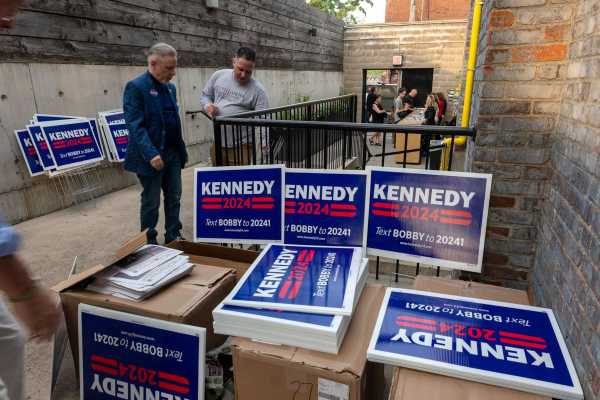
People wait for the arrival of Democratic presidential candidate Robert F. Kennedy, Jr. at a campaign event with voters in Brooklyn on August 30, 2023 in New York City.Spencer Platt/Getty Images
Another attendee at last week's North Charleston town hall raised the concern that Kennedy may be a spoiler for Biden and open up a lane for Republicans to take back the White House, something the candidate brushed off.
"If you don't mind, in this room, if you are a Republican, raise your hand," Kennedy asked of the audience, with several attendees' hands going up.
"OK, so, I don't think I'm hurting President Biden, let me just rest my case," he said to applause, a tacit acknowledgment of his growing support among a base broader than just Democratic voters.
Biden is significantly ahead of Kennedy in the polls — 67% to 11%, according to the latest major polling average from FiveThirtyEight.
DNC members have brushed off Kennedy's criticisms of their nominating process. Maria Cardona, a member representing Washington, D.C., called his recent public statements "absolutely ridiculously insane" and a "desperation attempt" to stay relevant on the campaign trail.
Cardona also questioned why the candidate was only now speaking up about the DNC's decision-making process, which has been ongoing well over the past year through open meetings.
"This has been a long process, where we have had massive public meetings. Where were they? Where was Robert F. Kennedy Jr.? Did he come to any of those meetings? Did they chime in as to how they wanted to see this process run? Do they have ideas? The first time I've seen them," she said.
MORE: RFK Jr. super PAC got $5M from megadonor who had backed Trump
On Tuesday, after repeated claims from Kennedy's campaign that they'd attempted to make contact with the national party, Harrison agreed to arrange for a meeting between the camps, according to a letter obtained by ABC News.
"Based on statements made in the media and in fundraising appeals" from Kennedy's campaign, Harrison wrote, it "is clear that there are serious misunderstandings of the Democratic nominating process that are important to correct."
The DNC held a meeting in Washington, D.C., Thursday, where they reviewed delegate selection plans and provided updates on outstanding plans, among other items. A few Kennedy supporters attended the meeting, but did not interrupt it — though they circulated printed copies of Kennedy's open letter to Harrison to party members.
One Kennedy supporter, Kyle Kemper, parked a bus decorated with the candidate's face plastered over it in front of the D.C. hotel where the party convened.
"We would still support RFK if he switches parties," Kemper said. "In New Hampshire, he declared that by Oct. 15, he'll be making a decision whether to support and continue the family legacy of being one of the best Democrat candidates the world has ever seen. Or … take on the DNC and take on the establishment."
MORE: Video RFK Jr. on presidential run: 'I feel like my country was being taken away from me'
DNC member and ABC News political contributor Donna Brazile questioned Kennedy's allegiance to the Democratic party amid his recent criticisms.
"I recognize that part of their political strategy might be to take on the party in a run as an anti-establishment candidate, get in line, how he was anti-establishment. Rev. Jesse Jackson was anti-establishment, Bernie Sanders ran as an anti-establishment," Brazile said.
"The difference is those candidates competed, and they failed to win the nomination, but they continue to be involved in a process. Anyone who is a true Democrat would not threaten to leave the party."
Sourse: abcnews.go.com
